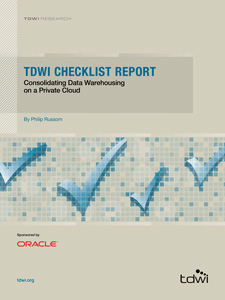
TDWI Checklist Report // Consolidating Data Warehousing on a Private Cloud
May 10, 2011
Recent years have seen growing interest in various approaches to clouds and server virtualization. So far, most cloud use cases focus on application servers. Yet, there are many reasons user organizations also need a “database cloud” for database management systems (DBMSs), data, and data-driven applications such as business intelligence (BI) and data warehousing (DW).
- Common cloud goals—such as the efficient use of servers— apply to data servers, too.
- Data management receives common cloud benefits, such as higher availability and performance, but with lower capital and operating expenses.
- Data management needs agility, and a database cloud rapidly provisions data resources with minimal performance tuning, thereby accelerating the deployment of new data functionality.
- Big data demands data platforms that scale automatically as data volumes spike and subside.
- Operational and transactional applications have already proved the benefits of clouds and virtualization. It’s time to migrate DW and BI servers onto these modern platforms.
- Many organizations have allowed the proliferation of data marts, operational data stores, and data staging areas. Users needing to consolidate these should consider a database cloud as a powerful and flexible data warehouse consolidation platform.
- When used as a consolidation platform, a database cloud simplifies data management by reducing the number of configurations, servers, database versions, and operating systems.
- Many organizations need to deploy new types of DW workloads, especially for real time and analytics. A database cloud can handle multiple, concurrent data workloads better than most traditional DW platforms can.